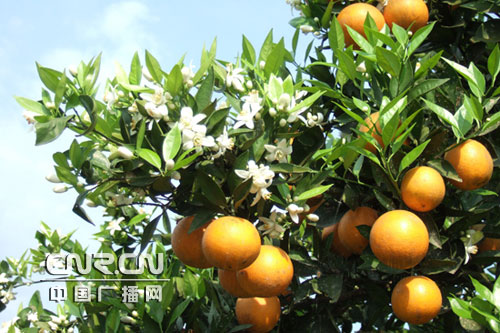Citrus economy: science and money in the orange grove
At the end of 2008, Zhongxian County of Chongqing Municipality produced China's first cup of pure, undiluted citrus juice a natural beverage free of additives and antiseptics. According to industry insiders, Zhongxian County in the Three Gorges Reservoir Area follows only Florida in the United States and Sao Paulo in Brazil, to become a provider of high quality citrus juice to the world.
 |
| File photo: Orange trees and the fruit in Zhongxian County of Chongqing Municipality. |
Peeling off the profits
Four years ago, Ma Heli and his wife planted orange trees on their property in Youyi Village, Zhongxian County and never looked back. His orchard of 0.27 hectares yielded 8,000 kilograms of the fruit, a harvest that netted him RMB 10,000 from the processing plant. "I also do some odd jobs. Since life has got better for us we can take things easy," said Ma Heli.
Zhongxian County has a history of 2,300 years and is the only county in the three Gorges Reservoir Area that has preserved the old look of its days as a county seat. It is considered the best place for citrus production in China.
After investigating the tracts of surrounding land, experts concluded that the period after the large reservoir begins to retain water produces a thermal effect most suitable for citrus trees. The new varieties of seasonal oranges cultivated in Project 948 of the Ministry of Agriculture consist of Fengjie late-ripening orange, Kaixian spring orange, and tarocco blood orange (Citrus sinensis Osbeck). They have diversified the citrus crops of the reservoir area, and are fruits for which China owns independent intellectual property rights.
The impetus to grow fruit goes way back in Zhongxian County; it is the cradle of the Ba Culture and crops here traditionally included litchi and citrus. Zhu Xiyan, secretary of the CPC Zhongxian County Committee, informed us, "In the Tang Dynasty (618-907), Bai Juyi encouraged the local people to plant trees when he served as the governor of Zhongzhou Prefecture (present-day Zhongxian County). The jurisdiction is the second largest relocated county in the Three Gorges Reservoir Area. More than a decade ago, the county authorities began to industrialize the production of oranges as various localities were busy resettling the waterside populations."
Liu Guizhong, magistrate of Zhongxian County, told China Today that the county practices standardized management of the trees. Orchard density is standardized, averaging 675 trees per hectares all nurtured by organic fertilizer. Processing policy demands the juice be pressed within 24 hours of harvesting. No additives or antiseptics are added, and the juice is canned immediately.
Zhongxian County, with its population of 900,000, supplied 1,000 tons of fresh citrus juice to the market in 2009. Still, the supply falls short of demand. Following the fertility period of the fruit trees, orange juice is shipped to two collection depots in downtown Chongqing: one at No. 1 Bridge in Yuzhong District, and the other at Three Gorges Square in Shapingba.
As early as 1997, people in Zhongxian began their cooperation with an international and advanced juice producer. In the winter of that year, American entrepreneur Mr. Edgar M. Bronfman Sr. came to Zhongxian. The president of Shigelan Co., Ltd., heads up one of the top 500 companies in the world specializing in beverages and entertainment. Bronfman Sr. attended the foundation-laying ceremony of Shigelan Tropicana's Citrus Technical Center. This is the first large project from abroad to settle in the county and also the largest agricultural industrialization project of Chongqing Municipality.
Prior to that, the senior Bronfman had visited many places in China, but chose Zhongxian County as his fruit juice production and processing base, thinking it the best location for citrus orchards in Asia. Shigelan invested US$11 million in construction of the citrus technical center here and set up a technical training function. The Chinese side is responsible for the construction of 4,000 hectares of orchard, and the two investor bodies jointly built processing capacity for 300,000 tons of non-concentrated fresh juice annually.
This project has aroused the interest of Tung Chee Hwa, vice-chairman of the National Committee of the Chinese People's Political Consultative Conference when he was visiting Chongqing, who hopes that "orange juice drinkers around the world can drink the products of Zhongxian."
 0
0 






